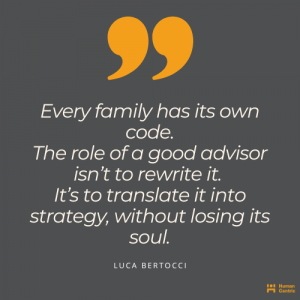What Family-Owned Businesses Can Teach Us About Strategy That Big Corporations Often Miss

Rooted in tradition, driven by conviction — like a well-tended vineyard, strategic execution in family businesses grows strongest when nurtured from the top.
Luca Bertocci’s latest article reveals how family businesses execute strategy better—when top leadership drives quiet, decisive alignment.
Written by Luca Bertocci, university lecturer and co-owner of boutique consultancy Human Centric Group, the article draws from over 20 years of advisory experience with global leaders in sectors such as consumer goods, retail, manufacturing, and technology. Having worked across more than 30 countries, Bertocci distills what actually drives alignment inside organizations where leadership isn’t just a job title—it’s a generational commitment.
Rather than offering a framework or textbook model, Bertocci focuses on lived experience and nuance. He argues that in family businesses, strategy takes hold not because it’s mandated, but because it’s deeply believed.
“When the top is involved—really involved—everything moves differently,” Bertocci writes. “Execution happens, resistance fades, and strategy becomes a shared commitment instead of a PowerPoint.”
Why Family Businesses Outperform
The article challenges corporate assumptions that family-run companies are outdated or resistant to change. In fact, many show extraordinary adaptability and longevity—especially in regions like Italy, Spain, Portugal, and Turkey, where businesses often span multiple generations.
These enterprises don’t follow the same playbook taught in MBA programs. They’re guided by rituals, values, and unwritten rules—what Bertocci calls “quiet strategic intent.” That intent often comes from a founder or heir who may not dominate meetings but whose belief in a project drives decisions across departments.
“Every family has its own code. The role of a good advisor isn’t to rewrite it. It’s to translate it into strategy, without losing its soul,” Bertocci notes.
When owners or senior family members show visible conviction, strategic momentum follows. Teams align. Resistance drops. Middle managers stop buffering and start bridging.
What Big Corporates Often Miss
In large corporations, execution breakdowns are often framed as operational issues. But Bertocci suggests they’re often something else entirely: misalignment at the top.
He outlines familiar symptoms:
• Ideas that stall for lack of sign-off
• Sales teams that “wait for the nod”
• Strategy documents that get bigger, but less clear
• Senior leaders who quietly admit, “I’m not sure what we’re trying to be anymore”
In family businesses, when conviction exists at the highest level, none of these symptoms appear. Everyone knows where they’re going—and why.
A Call for Discreet, Strategic Partnership
The article also makes a compelling case for a role many family companies don’t even realize they need: a discreet strategic advisor who helps them clarify how the brand shows up, internally and externally—not through slogans, but through decisions that are coherent, aligned, and culturally grounded.
Bertocci writes from first-hand experience, having quietly advised multiple owners and boards navigating legacy transitions, rebrands, and cross-generational shifts. He cautions against the use of off-the-shelf consulting models in family enterprises. What works in a public multinational with distributed governance often falls flat in environments driven by history, intuition, and emotional logic.
“Pushing a ready-made solution, even if brilliant, can be like trying to teach a foreign language by raising your voice. It won’t land. Not because they didn’t hear you. Because it wasn’t their language.”
For Those Thinking in Decades, Not Quarters
The article resonates with a specific type of leader—one who sees their company not just as a financial engine, but as a legacy. It also speaks to trusted advisors, board members, and private equity partners working with family-controlled businesses and seeking greater alignment.
Whether you're advising, investing in, or leading a family enterprise, the message is clear: when the top is aligned, execution doesn’t need to be pushed—it flows.
Read the Full Article
The full article “What Family Companies Teach Us About Strategic Execution” is available now at:
Ambulatory Infusion Center Market Set to Witness Significant Growth by 2025-2032 | Option Care Health, Inc., CVS Health
Dookan Adds India Gate’s Newly Launched Rice Collection to Its Offerings
ONMA Scout bringt intelligentere Google-Werbestrategien für Frankfurter Marken
Kalendarium
Więcej ważnych informacji
 Jedynka Newserii
Jedynka Newserii

 Jedynka Newserii
Jedynka Newserii

Edukacja

Coraz więcej Polaków widzi korzyści płynące z obecności w UE. Co ósmy wciąż jednak nie potrafi ich wskazać
Członkostwo w UE cieszy się wśród Europejczyków rekordowo wysokim poparciem – wynika z tegorocznego Eurobarometru. Korzyści dla swojego kraju dostrzega 74 proc. obywateli Unii – to odsetek najlepszy od początku badań w 1983 roku. A w Polsce jest on jeszcze wyższy. Doceniamy przede wszystkim wkład UE w bezpieczeństwo, nowe możliwości zawodowe i rozwój gospodarczy kraju. Po 21 latach naszej obecności w UE wciąż jednak potrzebna jest europejska edukacja.
Polityka
Zmiany w obowiązku magazynowania gazu mogą obniżyć ceny surowca. To pomoże się przygotować do sezonu zimowego

Elastyczność bez zagrożenia dla bezpieczeństwa energetycznego – tak nową propozycję przepisów dotyczących uzupełniania zapasów gazu przed sezonem zimowym określają jej inicjatorzy z Parlamentu Europejskiego. Europosłowie proponują nieznaczne zmniejszenie wymaganego poziomu zapełnienia magazynów i rozciągnięcie w czasie terminu, w którym trzeba spełnić ten obowiązek. Jak podkreśla Borys Budka, ma to zapobiec spekulacjom na rynku gazu i tym samym pomóc obniżyć ceny surowca.
Konsument
Możliwość zakupu online może zachęcić kolejne grupy Polaków do ubezpieczeń zdrowotnych. Dziś korzysta z nich już prawie 5,5 mln osób

Polska jest jednym z liderów Europy w obszarze cyfryzacji sektora usług medycznych. Świadczą o tym m.in. popularność elektronicznych narzędzi zapewniających dostęp do danych zdrowotnych, e-recept czy wirtualna diagnostyka. Polacy są też otwarci na innowacje w zakresie ubezpieczeń zdrowotnych, z których korzysta już blisko 5,5 mln osób. Za pomocą nowej cyfrowej platformy Medicover chce zachęcić klientów do samodzielnej konfiguracji i zakupu polis online.
Partner serwisu
Szkolenia

Akademia Newserii
Akademia Newserii to projekt, w ramach którego najlepsi polscy dziennikarze biznesowi, giełdowi oraz lifestylowi, a także szkoleniowcy z wieloletnim doświadczeniem dzielą się swoją wiedzą nt. pracy z mediami.









.gif)

 |
| |
| |
|